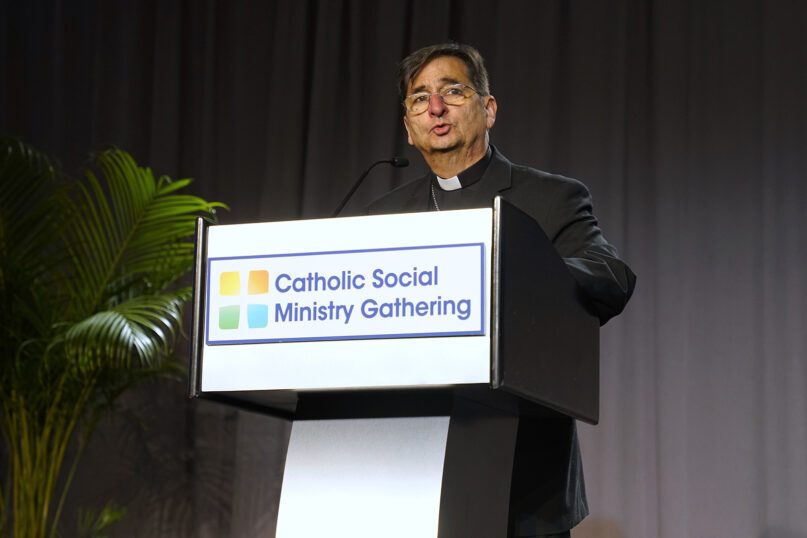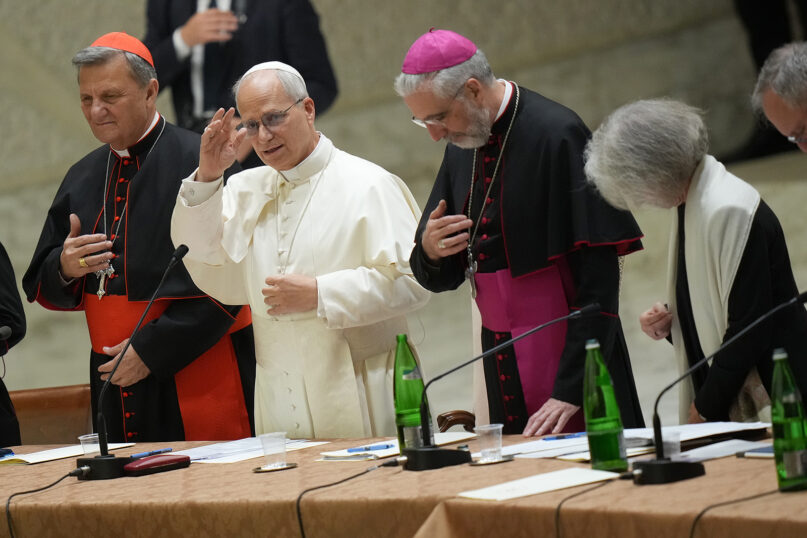(RNS) — In his first speech from the loggia of St. Peter’s Basilica, the newly elected Pope Leo XIV took the opportunity to endorse synodality, signaling that this cornerstone theological idea of Pope Francis’ papacy would continue to guide the Catholic Church. With Leo’s backing, Catholic leaders in the pope’s home country have wasted no time in implementing its practical applications.
Synodality, with its emphasis on dialogue as a way of making church decisions, was the focus of a three-year-long process of listening to lay Catholics about their concerns with the church and gathering bishops for the Synod on Synodality, which Francis expanded to include other leaders and thinkers. The synod became a point of controversy in the church, as some conservatives warn it will drain the authority of priests, bishops and cardinals over moral and theological issues.
In the Diocese of Yakima, Washington, which has significant numbers of migrant agricultural workers, Bishop Joseph Tyson has adapted the “conversations in the spirit” that made up much of the synod’s discussions to try to change the narrative on immigration in his region. Conversations in the spirit are “ a type of listening where you’re grounded in Scripture,” said Tyson, who added that he also drew on a book by a Holy Cross priest, the Rev. Daniel Groody, “A Theology of Migration: The Bodies of Refugees and the Body of Christ.”
This spring and summer, the diocese held several sessions in which immigrant priests, many of whom crossed the border without authorization as children, shared their stories. “ We can debate politics, we can even debate theology, but you really can’t argue with a person’s story,” said Tyson.
After each priest spoke, Tyson asked those listening to reflect on what they had heard. “ How did their story connect to any part of the migration stories that you remember from the Bible and what stood out? What piece of their immigration story touched your mind and heart?” he said, asking them to share without debating one another. The priests’ stories are not a “political narrative,” but a “biblical” one, Tyson said, making the comparison to the migration story in Exodus.

Bishop Joseph Tyson addresses the Catholic Social Ministry Gathering, Jan. 27, 2025, at the Hyatt Regency Washington on Capitol Hill in Washington, D.C. (Photo courtesy of U.S. Conference of Catholic Bishops’ Secretariat of Justice and Peace)
This synodal approach takes “ some of the electricity off the polarization because you’re not debating immigration reform,” said the bishop.
Other U.S. dioceses are holding synodal listening sessions to plan their ministries. Over the past two months, the Diocese of Phoenix has held a Synod of Young Adults for younger adults, both practicing Catholics and those who have fallen away from the church. The sessions — 60 in English and 12 in Spanish — are being held in venues such as parishes, college campuses, monasteries and even the Arizona Opera in order to include participants who might be uncomfortable coming to a church-owned space.
In April, the diocese brought in José Manuel de Urquidi, a digital evangelizer and podcaster who was a delegate to the the Synod on Synodality at the Vatican (he sat at the same table as Cardinal Robert Prevost, now Pope Leo) to help train 120 facilitators and scribes for the synod.
In the Synod of Young Adults, participants were asked to consider “four questions about relationships, marriage and family life, and how the Church might best nourish them spiritually,” according to the Rev. Charles G. Kieffer, the diocese’s vicar for synodality and planning.
Kieffer said the sessions so far have been diverse, with as many as 80 participants and as few as four. (A few were unattended.) “The important thing, though, is that they’ve shown up to let their voices be heard,” he told Religion News Service.
After the listening phase, the Phoenix Diocese plans to create a preliminary report to be used at a Feb. 14 synodal assembly, which in turn is tasked with creating a final report to guide the diocese’s ministry in the future.
Kieffer said the diocese anticipates holding several more synods for various groups as part of its seven-year pastoral plan titled TILMA, “Testifica, Oh Iglesia, a la Luz del Misterio del Amor” (Testify, Oh Church, to the Light of the Mystery of Love), leading up to the 500th anniversary of the apparitions of Our Lady of Guadalupe, the patroness of the Diocese of Phoenix.
The Diocese of Dallas, which has a 45-member synod implementation commission of laypeople, deacons and priests, plans to release a pastoral plan in December based on its own synod. In a pastoral letter, Bishop Edward Burns identified goals such as upholding church teaching on gender and sexuality and life issues as priorities.
Those kinds of goals run counter to conservative Catholic fears — and reformer hopes — that synodality will reshape church teaching on gender and sexuality, but it remains unclear whether those kinds of synodal results will reorient the apathy and skepticism of some U.S. priests.
Those fears, articulated by prelates in Rome and elsewhere, have likely impacted the engagement of U.S. priests with the synodal process. In a recent survey by the Catholic Project at The Catholic University of America, 37% of surveyed priests in the U.S. agreed that “The Synod on Synodality was a waste of time.” Only half of priests said synodality should be a priority of the American church.
A major effort aimed at educating Catholics about synodality, known as Together/Juntos/Insieme, spans both North and South America. The project was spearheaded by Rafael Luciani, a professor of systematic theology at the Santa Clara Jesuit School of Theology in Berkeley, California, who is a member of the theological team for the Vatican synod office. In late August, Leo gave his support in a private audience with Luciani, and the program was officially launched in late October at a Vatican event for teams implementing synodality on the local level.

Pope Leo XIV delivers his blessing at the end of an audience with the participants in the Jubilee of the Synodal Teams and Participation Bodies in the Paul VI Hall, at the Vatican, Oct. 24, 2025. (AP Photo/Alessandra Tarantino)
It is backed by the influential Latin American bishops’ conference, known as CELAM, where Luciani is director of the Biblical-Pastoral Theological Center, as well as by the Jesuit School of Theology, the Confederation of Latin American and Caribbean Religious and the Latin American Observatory of Synodality.
The initiative’s free online course about the findings of the Synod on Synodality has already drawn more than 5,000 students since its Oct. 20 launch. Its themes are familiar to the Synod on Synodality, such as accountability and transparency, managing consensus and dissent, women’s leadership and co-governance and shared decisions. Several officials involved in the Synod on Synodality will appear on the modules, including Sister Nathalie Becquart and Cardinals Mario Grech, Jean-Claude Hollerich and Roberto Repole.
Even outside of these formal synodal programs, Catholic institutions are weaving synodality into their culture. Erick Rubalcava, chief of mission and Catholic identity for the Archdiocese of Los Angeles’ schools, said implementing synodality means “ promoting co-responsibility for the ministry among clergy, educators, parents, and the students.”
He and the superintendent for archdiocesan schools, Paul Escala, said that the synodal approach is key to their mission of evangelization. Many families at Catholic high schools may not be actively involved in a parish where they are experiencing synodality, Escala said. Giving them a voice and activating “ their sense of belonging to church” is part of evangelization, he added.
“ It’s living synodality through the lens of Catholic schools as the future of the church,” Escala said.



